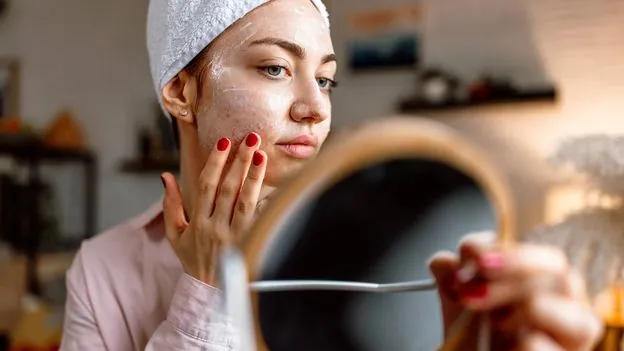
The Surprising Truth Behind Skin Probiotics: Do They Really Work?
2025-04-02
Author: Ming
Recent studies have unveiled the critical role that the diverse community of bacteria and fungi residing on our skin plays in maintaining our overall health. But can we enhance these tiny allies with skin probiotics for better skin health?
When you peel away the outer layers of your skin, you'll discover a vibrant microcosm teeming with bacteria. This ecosystem is increasingly recognized for its potential to keep our skin youthful, smooth, and resilient. These "good bacteria" work tirelessly to protect against harmful pathogens and aid in wound healing, potentially even mitigating some adverse effects of UV radiation.
As awareness of the skin microbiome grows, many are turning to topical probiotics—products that claim to apply live microorganisms directly to the skin to improve its health. This trend actually dates back to 1912, when early scientists began experimenting with applying bacteria to people's faces to treat conditions like acne and seborrhea.
Today, the market is flooded with what are marketed as probiotic skincare products, encompassing everything from serums to moisturizers. These products promise to rebalance the skin's microbiome, leaving it revitalized. However, most of these products do not actually contain live bacteria. Instead, they often include prebiotics, which nourish beneficial bacteria, or postbiotics, which are products of these bacteria’s metabolism.
"The regulations surrounding skincare products differ significantly from those for pharmaceuticals," explains Richard Gallo, a dermatologist at UC San Diego School of Medicine. "This means that manufacturers can make claims with less testing and validation." Because skin probiotics are categorized as cosmetics, comprehensive clinical trial data is often lacking or undisclosed, raising questions about their effectiveness.
Recent initiatives, such as those spearheaded by Bernhard Paetzold and his company S-Biomedic, focus on restoring the skin's microbiome through bacterial "transplants." The challenge lies in the fact that live bacteria are notoriously difficult to keep alive during manufacturing and distribution, and once applied to the skin, they have to compete with numerous existing microbes for colonization.
Understanding the complex relationship between skin bacteria and various skin conditions—like eczema, acne, and rosacea—remains a significant scientific quandary. While it’s evident that shifts in the skin microbiome correlate with skin diseases, it remains unclear if such shifts are a cause or a consequence of these conditions.
Clinical trials exploring the effects of probiotics on skin health are emerging, particularly in treating atopic dermatitis (eczema). Gallo's group has been investigating Staphylococcus hominis, a benign bacterium found in healthy skin, to target pathogenic strains like Staphylococcus aureus that dominate the skin of eczema patients. A promising 2021 study indicated that applying a cream containing live S. hominis significantly reduced S. aureus levels and improved symptoms of eczema.
Other studies have made strides as well. Research from 2003 used Streptococcus thermophiles to improve skin hydration by boosting ceramide production. A 2018 trial even demonstrated that applying Roseomonas mucosa, isolated from healthy skin, could enhance symptoms in eczema patients by over 50%.
Despite these advancements, researchers caution that evidence linking probiotics directly to improvements for those without specific skin diseases is limited. Gallo notes, "Many products claiming probiotic benefits lack strong empirical support, so they may not be worth the investment."
While further research is necessary to substantiate probiotic effectiveness and explore their applications for various skin conditions—including acne and skin cancer prevention—practicing good skin care habits remains vital. Protecting your skin with appropriate moisturizers and sun protection can create a favorable environment for beneficial organisms to thrive.
In summary, the field of skin probiotics is promising and evolving rapidly. Experts are optimistic about future developments, advancing our understanding of how specific microbes can benefit skin health. However, until more rigorous testing is conducted, it may be wise to approach off-the-shelf probiotic skincare products with caution. Embrace the power of good skincare routines to support your skin's natural defenses and microbiome health in the meantime!

 Brasil (PT)
Brasil (PT)
 Canada (EN)
Canada (EN)
 Chile (ES)
Chile (ES)
 Česko (CS)
Česko (CS)
 대한민국 (KO)
대한민국 (KO)
 España (ES)
España (ES)
 France (FR)
France (FR)
 Hong Kong (EN)
Hong Kong (EN)
 Italia (IT)
Italia (IT)
 日本 (JA)
日本 (JA)
 Magyarország (HU)
Magyarország (HU)
 Norge (NO)
Norge (NO)
 Polska (PL)
Polska (PL)
 Schweiz (DE)
Schweiz (DE)
 Singapore (EN)
Singapore (EN)
 Sverige (SV)
Sverige (SV)
 Suomi (FI)
Suomi (FI)
 Türkiye (TR)
Türkiye (TR)
 الإمارات العربية المتحدة (AR)
الإمارات العربية المتحدة (AR)